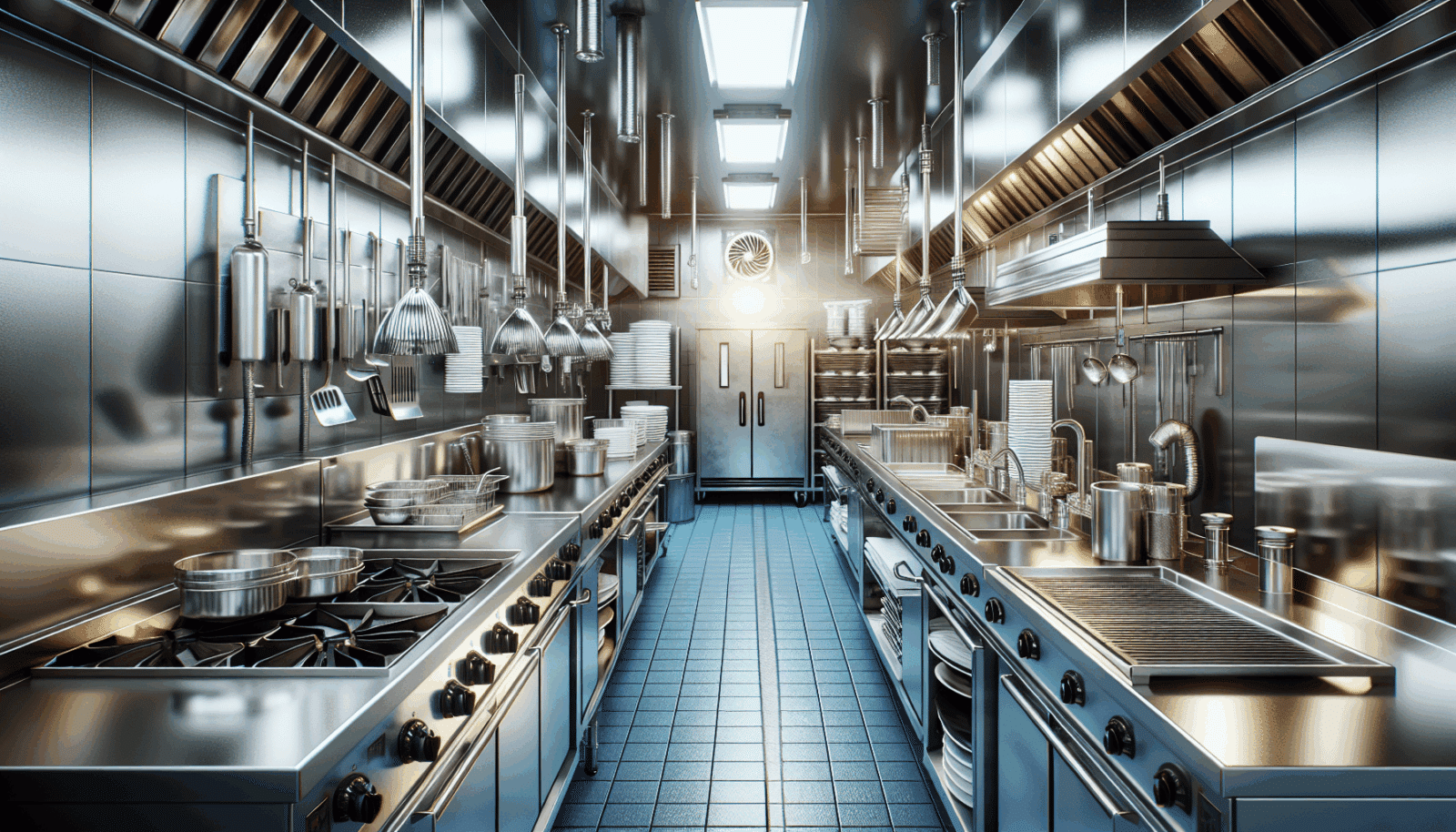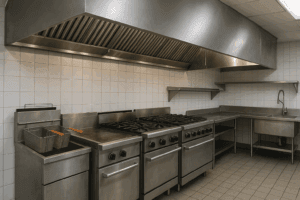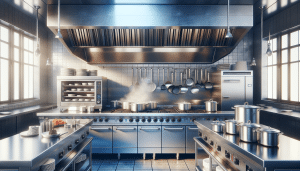Managing Grease in a restaurant’s kitchen is one of the stealthiest challenges faced by business owners in the food industry. Fortunately, with the right approach to grease management, it can be a battle easily won. At Utah Hood Cleaning, our expertise is not limited to hood cleaning; we also offer insights and solutions to grease-related concerns across Salt Lake, Davis, and Utah County. This guide is tailored to help restaurant owners navigate the murky waters of grease management effectively.
The Importance of Grease Management
Understanding why grease management should be a priority can dramatically impact the daily operations of your restaurant. Accumulated grease poses a considerable fire hazard, making your establishment susceptible to dangerous situations. Moreover, improperly managed grease can lead to costly plumbing issues, which may disrupt your business and require expensive repairs. Implementing an effective grease management system not only enhances safety but also promotes a healthier working environment for your staff.
In addition to these practical concerns, regulatory compliance is yet another reason to prioritize grease management. Local health and safety standards typically mandate specific guidelines for grease disposal. Failure to adhere to these guidelines can result in fines or, worse, the temporary closure of your establishment. At Utah Hood Cleaning, we understand these challenges and are here to assist you in maintaining a clean, safe, and compliant kitchen.
Grease Traps: Your First Line of Defense
Installing a grease trap is a fundamental step in any effective grease management strategy. Grease traps are designed to intercept fats, oils, and greases (FOG) before they enter the wastewater system. By capturing these substances, grease traps not only prevent clogs in your plumbing but also reduce the stress on municipal water treatment facilities.
Regular maintenance and cleaning of your grease trap are crucial. A neglected grease trap can become less effective over time, leading to unpleasant odors and potential backups. At Utah Hood Cleaning, we offer professional cleaning Services to ensure that your grease trap functions efficiently and remains compliant with local regulations.
Proper Grease Disposal Practices
Adopting proper grease disposal practices is essential for every restaurant. Throwing grease down the sink or toilet is not just harmful to your plumbing; it’s also harmful to the environment. Instead, grease should be collected in a designated container and either recycled or disposed of according to local regulations.
Utah Hood Cleaning advocates for sustainability and encourages restaurants to explore grease recycling options. Recycled grease can be converted into biofuel, providing a greener alternative to traditional disposal methods. By choosing to recycle, you’re not only managing grease responsibly but also contributing to a more sustainable future.
Regular Kitchen Hood Cleaning
One key aspect of grease management that is often overlooked is the importance of regular kitchen hood cleaning. Grease and other residues can accumulate on Kitchen Hoods and vents, posing a significant fire hazard. Regular cleaning of these areas is essential to prevent grease-related fires.
Our team at Utah Hood Cleaning specializes in thorough hood cleaning services. We ensure that all accessible parts of the hood, filters, and ductwork are free from grease buildup, thereby enhancing the safety and efficiency of your kitchen’s ventilation system.
Employee Training on Grease Management
Equipping your team with the necessary knowledge on grease management is a vital part of maintaining a safe and efficient kitchen. Training should cover proper disposal practices, the importance of cleaning grease traps, and the risks associated with grease buildup.
We believe that well-informed employees are your best asset in preventing grease-related issues. Utah Hood Cleaning offers educational resources and training support to help your staff understand and implement best practices in grease management.
Maintaining Grease Removal Devices
Grease removal devices such as automatic grease traps require regular maintenance to function effectively. Neglecting these devices can lead to reduced efficiency, resulting in more grease entering the wastewater system than intended.
It’s important to establish a routine maintenance schedule for all grease management equipment. This schedule should include regular inspections, cleaning, and repairs as needed. At Utah Hood Cleaning, we offer comprehensive maintenance services to keep your grease removal devices in top condition.
Overcoming Common Grease Management Challenges
- Limited Space for Grease Equipment: Many restaurants struggle with finding enough space for grease management equipment. Optimizing kitchen layout and exploring compact grease trap options can help overcome this challenge.
- Ensuring Compliance with Local Regulations: Staying up-to-date with the latest regulations is essential. Partnering with a professional service like Utah Hood Cleaning can help ensure your grease management practices comply with all legal requirements.
- Training Staff on Best Practices: Continuously educating your team on the importance of grease management and proper disposal methods is crucial. Implementing regular training sessions can keep everyone informed and engaged.
- Dealing with Grease Buildup: Preventative measures, including regular cleaning and maintenance, are key to managing grease buildup. Establishing a routine cleaning schedule can significantly reduce the risk of fires and plumbing issues.
- Cost of Maintenance and Equipment: While maintaining grease management equipment can incur costs, the investment is worthwhile considering the potential savings from avoided repairs and fines. Exploring cost-effective solutions and services is beneficial.
Advanced Grease Management Technologies
As technology advances, so do solutions for grease management. Innovative products such as bioremediation systems use microorganisms to naturally break down fats, oils, and greases into water and carbon dioxide. These systems can be a more environmentally friendly alternative to traditional methods.
Utah Hood Cleaning stays at the forefront of grease management technology, offering modern solutions that align with our commitment to sustainability and efficiency. Let us help you explore the latest advancements to find the best fit for your restaurant’s needs.
Seasonal Considerations in Grease Management
Different seasons can bring unique challenges to grease management. For instance, colder temperatures can cause grease to solidify more quickly, leading to potential blockages in pipes. It’s important to adjust your grease management practices accordingly to prevent seasonal issues.
Being proactive and preparing for seasonal changes can help ensure your restaurant operates smoothly all year round. Utah Hood Cleaning offers seasonal maintenance and cleaning services to help you adapt to any challenges that arise.
Contact Utah Hood Cleaning for Expert Support
Embarking on an effective grease management plan can seem daunting, but with the right support, it’s entirely achievable. At Utah Hood Cleaning, we’re dedicated to helping restaurants across Salt Lake, Davis, and Utah County maintain safe, efficient, and compliant kitchens.
Whether you’re looking for professional cleaning services, support with installation and maintenance of grease management equipment, or simply advice on best practices, we’re here to help. Connect with us today by phone at 801-853-8155 or Request a Free Quote to learn how we can assist you in managing your kitchen’s grease effectively.




